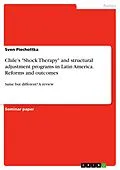Seminar paper from the year 2017 in the subject Politics - Region: Middle and South America, grade: 1,5, University of Potsdam (Chair for Political Science, Public Administration and Organization), course: Government and Governance in Developing Countries, language: English, abstract: In this short paper, I followed a comparative case study approach to explore the reforms and reform outcomes in four different Latin-American countries during the 1980s. I chose Chile as a successful example of structural adjustment politics and Bolivia, Peru and Argentina as deviating cases to evaluate different reform success. My findings supported a case-by-case evaluation. It turned out that orthodox structural adjustment policies were implemented differently in every country due to country-specific political, historical and institutional features as well as an altering relationship to international financing institutions. Generally, orthodox reforms seemed to back economic stabilization but not necessarily structural economic adjustment. A review of the current state of literature showed differing explanations for varying reform success. While some researchers attribute failure to heterodox deviation, others see a too orthodox course or suggest an explanation by inappropriate time and place for the reforms. Further research will be needed to clarify causalities. It is suggested to put a stronger focus on underlying context-dependent reform drivers and stumbling blocks.
